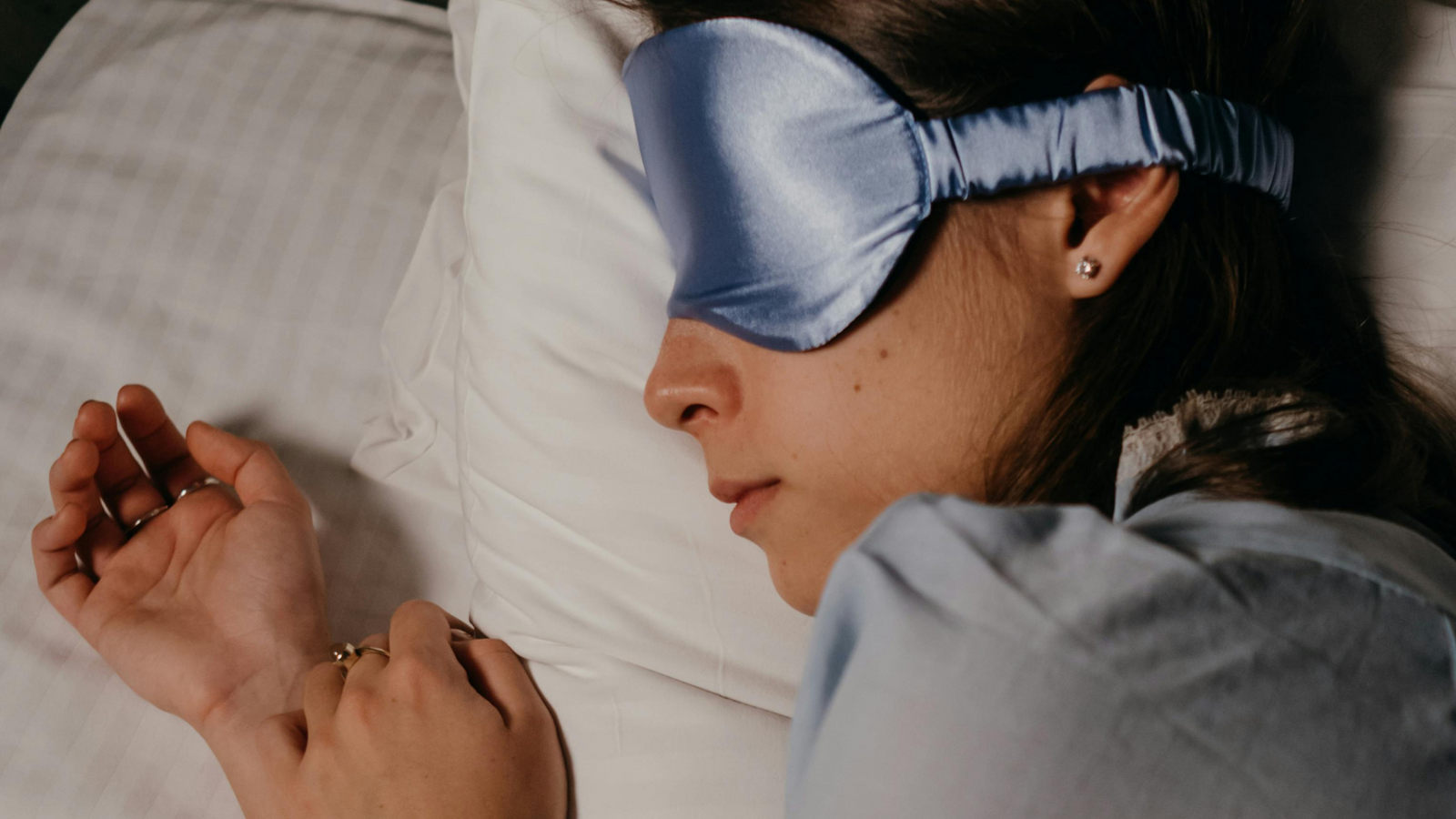Your Cart is Empty
Buy now, pay later or in 3 with Klarna
Get free shipping by subscribing to newsletter!
Fast shipping from our warehouse in the UK!
Buy now, pay later or in 3 with Klarna
Get free shipping by subscribing to newsletter!
Fast shipping from our warehouse in the UK!

How to Sleep Comfortably at Night
Nothing beats the feeling of waking up feeling rested and recharged after a good night’s sleep. But unfortunately for many, this idea exists only in our dreams. If you have trouble sleeping comfortably at night, we’re here to help.
In this post, we’ll touch on the science and importance of sleep and provide some detailed tips to help you learn how to sleep comfortably. Read on to learn about all of our snoozing suggestions, or use the links below to skip to the section you’re most interested in.
- Create a Relaxing Environment
- Establish a Bedtime Routine
- Make Your Body Comfortable
- Don’t Eat or Drink Too Close to Bedtime
- Turn The Lights Down as The Sun Goes Down
- Go to Sleep at The Same Time Every Night
- Avoid Technology Before Bed
1. Create a Relaxing Environment
Whether you’re a light sleeper disturbed by light and sound or are simply stressed when it’s time to go to bed, your environment can have a big impact on the quality of your rest. According to the Centers for Disease Control (CDC), the following recommendations can help you curate a relaxing environment, and in turn, improve your sleep:
- Darken your sleeping space by:
- Installing blackout blinds or curtains
- Blocking out light entering the room
- Cover or eliminate white and blue light sources (i.e. digital alarm clocks, TVs, cellphones, etc.)
- Wear an eye mask while you sleep
- Minimize or adjust noise levels by:
- Wearing ear plugs
- Using a white noise machine
- Turning off cell phone notifications
- Keep the thermostat to approximately 65°F
- Separate your work and entertainment areas from your sleeping space when possible

2. Establish a Bedtime Routine
If you’ve ever read a self-help publication or tips on how to improve your diet, exercise routine, or social skills, you’ve likely found that a routine is the typical proposed solution. Humans are considered creatures of habit, and when we get into a routine of doing something over and over again, our brains can tune in how we want them to. The same goes for sleep—if you meditate every night before bed, your brain may start to associate this activity with sleep.

The National Sleep Foundation supports this idea, saying that a bedtime routine can improve the quality and duration of sleep in both children and adults. So, what’s a good evening routine for adults who want to learn how to sleep more comfortably?
- Set a bedtime to train your circadian rhythm and schedule time for your bedtime routine, somewhere between 30 minutes and 2 hours before you go to sleep.
- Avoid the use of blue light devices and other electronics at least 2-3 hours before bedtime. Blue light can alter your circadian rhythm and potentially contribute to other medical issues.
- Take a warm bath or shower an hour before bedtime to trigger melatonin production. The contrast of the warm water and cool air when you get out can mimic the decrease in body temperature your body experiences when melatonin is released.
- Do relaxing stretches, meditation, or breathing exercises to help your body and mind wind down before you go to sleep. According to the Department of Pharmacology at Government Medical College in Nagpur, a daily yoga session can help adults sleep comfortably, and as a result, improve quality of life.
- Read a calming book before bed—try to avoid thrilling or suspenseful genres that may increase your heart rate as you’re trying to fall asleep.
- Prepare your sleeping sanctuary by closing the blinds, dimming the lights, setting the temperature, and undoing your bed. This routine can form a strong association between your brain and bedtime.
3. Make Your Body Comfortable
If you’ve ever had the misfortune of not falling asleep because your pillow isn’t sitting right or your back feels tight, you’re not alone. In fact, the Cleveland Clinic cites physical discomfort, pain, and the need to use the bathroom as the most common disturbances that prevent adults from sleeping comfortably.

Depending on the type of pain you're experiencing, solutions can be as simple as changing your pillow type or sleeping position, or may require consultation with your doctor. With that said, here are some ways you can manage discomfort at bedtime:
- Invest in comfortable bedding:If your blankets and pillows aren’t allowing you to sleep comfortably, it may be time to switch things up. Products like weighted blankets, cooling sheets, and body pillows may elevate your comfort and the quality of your sleep.
- Adjust your thermostat:As we mentioned earlier in this post, the National Sleep Foundation suggests keeping your bedroom at approximately 65°F for optimal rest.
- Use assistive devices:If you’re dealing with pain or another medical issue, like heartburn at night, consider a therapeutic body pillow. Medcline’s Shoulder Relief System helps alleviate nighttime shoulder pain by creating a comfortable position for side-sleeping without putting excess pressure on your downside arm. The Reflux Relief System aims to prevent nighttime acid reflux by simulating the most comfortable way to sleep with acid reflux—at an incline on your left side. These assistive devices directly address physical disturbances you might experience during sleep, and as a result, may boost the overall quality of your beauty rest.
- Consult your doctor:In some cases, pain or discomfort at bedtime may require the expertise of your doctor. If your problems are persistent or severe, contact your primary care physician for guidance.
4. Don’t Eat or Drink Too Close to Bedtime
There are several reasons why eating and drinking before bed can be a problem. For one, having to get up to use the bathroom can be disruptive, which may prohibit you from reaching the various important stages of sleep. On top of that, eating or drinking late at night has been linked to a number of other issues, including, weight gain, heartburn, and poor sleep. One study published to the Journal of Clinical Sleep Medicine found that eating late negatively impacted sleep quality in otherwise healthy individuals. To combat this, try eating earlier on in the evening instead.
5. Turn The Lights Down as The Sun Goes Down
As you already know, humans are creatures of habit. Not only do we enjoy routine on a behavioral level, but we’re also biologically predisposed to them. One example of this is light’s effect on the circadian rhythm, the internal clock that helps regulate our sleep patterns.
The National Sleep Foundation says light exposure plays a significant role in how the circadian rhythm identifies when it’s time to be awake and when it’s time to sleep. Artificial light exposure in excess or at inopportune times can cause a person's circadian rhythm to be out of sync with the day-night cycle. This can disrupt their sleep and potentially pose other health concerns, such as a slowed metabolism, weight gain, cardiovascular issues, and possibly an increased cancer risk.
Here are a few tips to help you strategize your light exposure, and in turn, sleep comfortably:
- Sleep in complete darkness
- Avoid technology in the bedroom
- Dim the lights in the evening

6. Go to Sleep at The Same Time Every Night
Getting into a sleep schedule is another thing you can do to train your circadian rhythm and improve the quality of your rest. The National Sleep Foundation recommends falling asleep and waking up at the same time every night and morning. While you may have some variation, it’s best not to stray more than two hours from your routine, even on the weekend.
7. Avoid Technology Before Bed
Although any type of light can inhibit melatonin production, blue light at night has a stronger effect. One Harvard study compared 6.5 hours of exposure to blue light versus exposure to green light of equivalent brightness and found that blue light limited melatonin production for twice as long as the green light and adjusted circadian rhythms by 3 hours, compared to the 1.5 hour change from green light.

You can minimize the effect of blue light on your sleep by:
- Reducing blue light exposure beginning two hours before bed
- Using blue light-blocking lenses
- Exposing yourself to light throughout the day and dimming them as it gets later
So, what’s the best way to sleep comfortably through the night? It depends—the answer is different for everyone. We hope these seven tips can offer a great starting point to improve the quality and duration of your rest.
To learn more about how our products can enhance your sleep and overall health, check out how MedCline works on our FAQ page.



